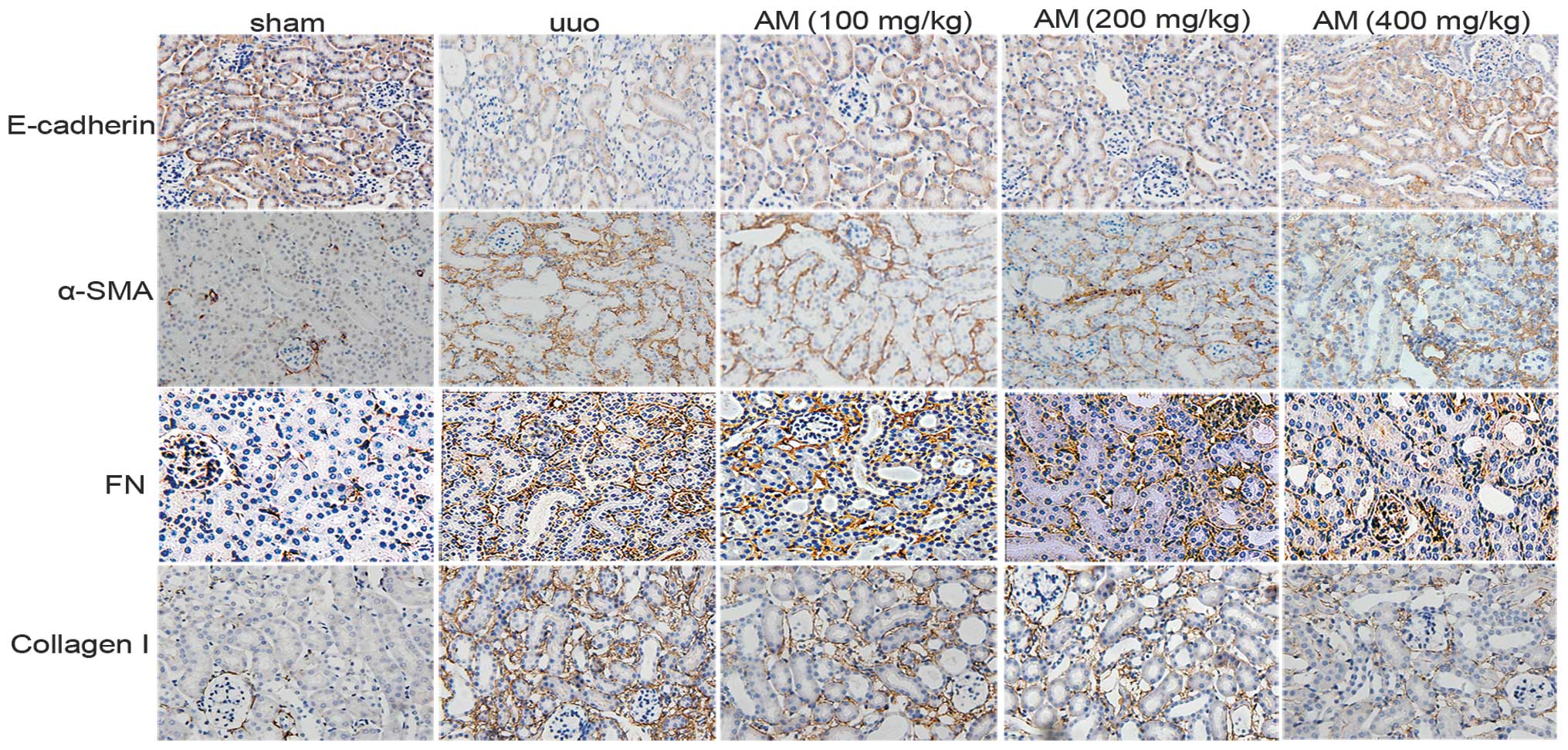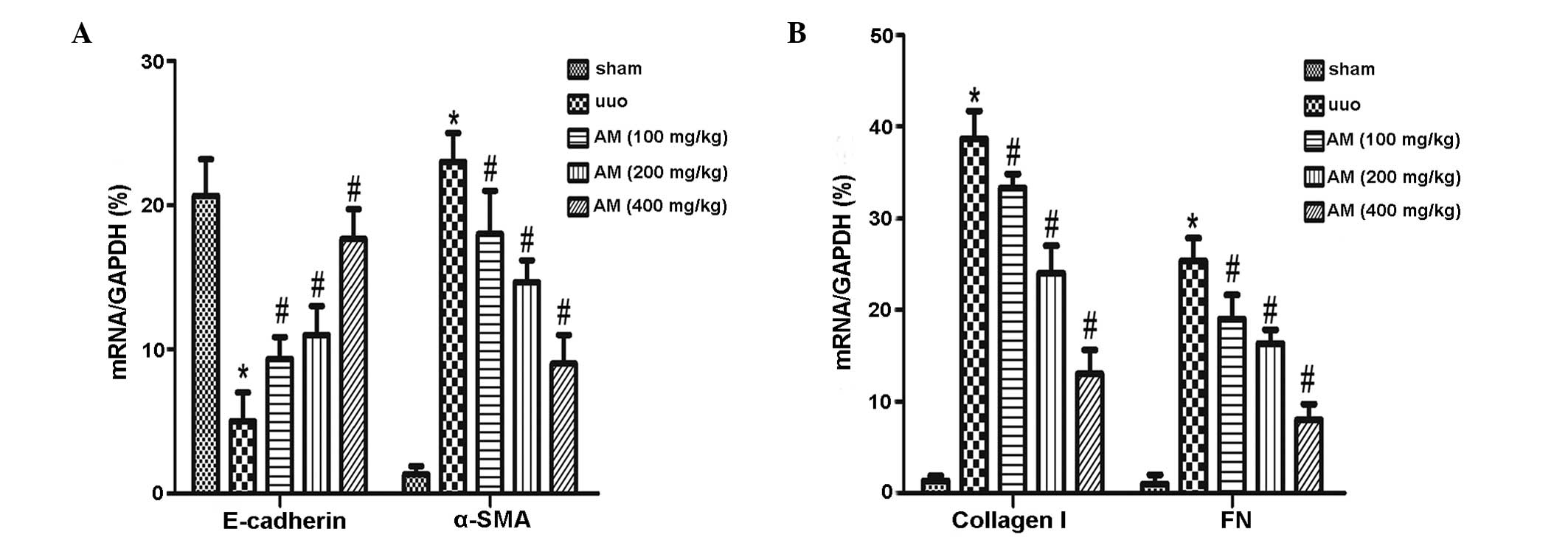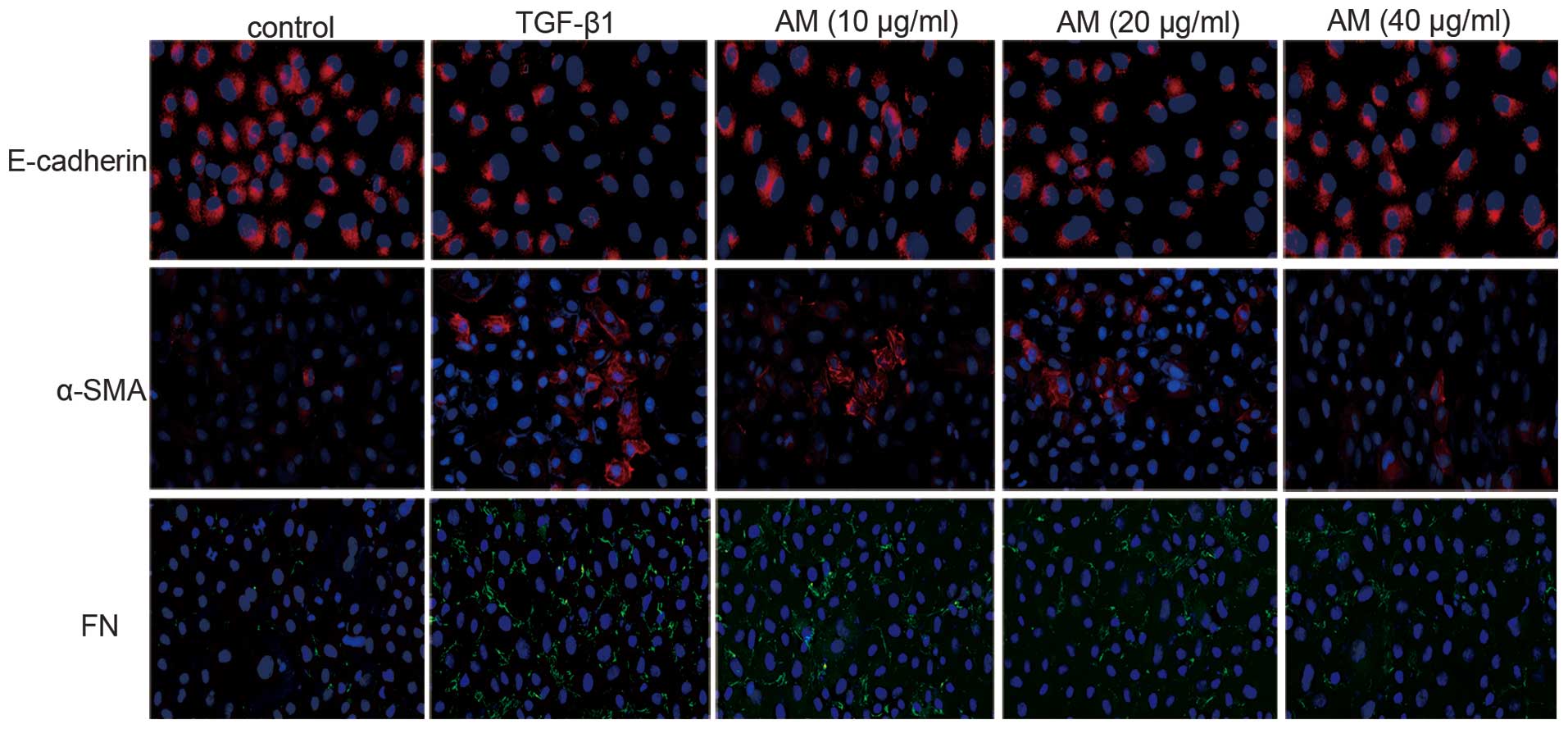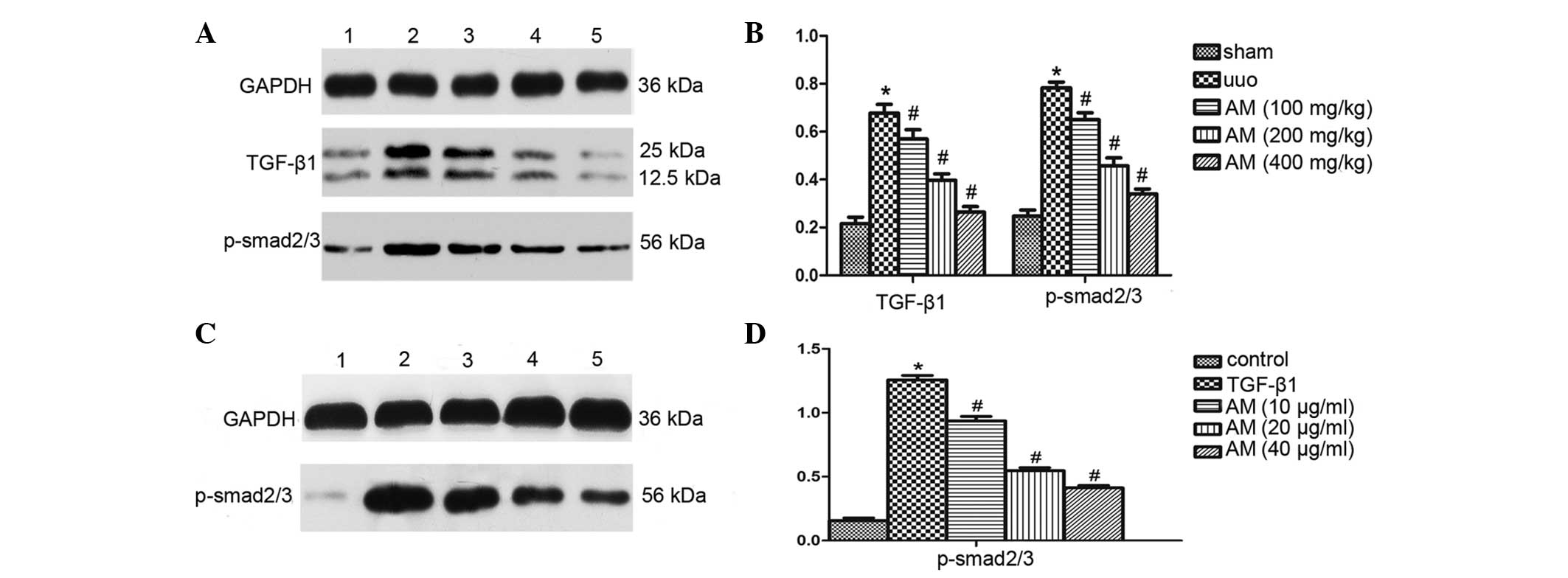|
1
|
Liu Y: Cellular and molecular mechanisms
of renal fibrosis. Nat Rev Nephrol. 18:684–696. 2011. View Article : Google Scholar
|
|
2
|
Liu Y: Renal fibrosis: New insights into
the pathogenesis and therapeutics. Kidney Int. 69:213–217. 2006.
View Article : Google Scholar : PubMed/NCBI
|
|
3
|
Falke LL, Gholizadeh S, Goldschmeding R,
Kok RJ and Nguyen TQ: Diverse origins of the myofibroblast -
implications for kidney fibrosis. Nat Rev Nephrol. 11:233–244.
2015. View Article : Google Scholar : PubMed/NCBI
|
|
4
|
Liu Y: New insights into
epithelial-mesenchymal transition in kidney fibrosis. J Am Soc
Nephrol. 21:212–222. 2010. View Article : Google Scholar : PubMed/NCBI
|
|
5
|
Zeisberg M and Duffield JS: Resolved: EMT
produces fibroblasts in the kidney. J Am Soc Nephrol. 21:1247–1253.
2010. View Article : Google Scholar : PubMed/NCBI
|
|
6
|
Zavadil J, Cermak L, Nieves NS and
Böttinger EP: Integration of TGF-β/Smad and Jagged1/Notch
signalling in epithelial-to-mesenchymal transition. EMBO 10.
23:1155–1165. 2004. View Article : Google Scholar
|
|
7
|
López-Hernández FJ and López-Novoa JM:
Role of TGF-β in chronic kidney disease: An integration of tubular,
glomerular and vascular effects. Cell Tissue Res. 347:141–154.
2012. View Article : Google Scholar : PubMed/NCBI
|
|
8
|
Na D, Liu FN, Miao ZF, Du ZM and Xu HM:
Astragalus extract inhibits destruction of gastric cancer cells to
mesothelial cells by anti-apoptosis. World J Gastroenterol.
15:570–577. 2009. View Article : Google Scholar : PubMed/NCBI
|
|
9
|
Yuan C, Pan X, Gong Y, Xia A, Wu G, Tang J
and Han X: Effects of Astragalus polysaccharides (APS) on the
expression of immune response genes in head kidney, gill and spleen
of the common carp, Cyprinus carpio L. Int Immunopharmacol.
8:51–58. 2008. View Article : Google Scholar : PubMed/NCBI
|
|
10
|
Gao J, Feng LJ, Huang Y, Li P, Xu DJ, Li J
and Wu Q: Total glucosides of Danggui Buxue Tang attenuates
bleomycin-induced pulmonary fibrosis via inhibition of
extracellular matrix remodelling. J Pharm Pharmacol. 64:811–820.
2012. View Article : Google Scholar : PubMed/NCBI
|
|
11
|
Du JX, Sun MY, Du GL, Li FH, Liu C, Mu YP,
Chen GF, Long AH, Bian YQ, Liu J, et al: Ingredients of Huangqi
decoction slow biliary fibrosis progression by inhibiting the
activation of the transforming growth factor-beta signaling
pathway. BMC Complement Altern Med. 12:332012. View Article : Google Scholar : PubMed/NCBI
|
|
12
|
Li Z, Zhang L, He W, Zhu C, Yang J and
Sheng M: Astragalus membranaceus inhibits peritoneal fibrosis via
monocyte chemoattractant protein (MCP)-1 and the transforming
growth factor-β1 (TGF-β1) pathway in rats submitted to peritoneal
dialysis. Int J Mol Sci. 22:12959–12971. 2014. View Article : Google Scholar
|
|
13
|
Livak KJ and Schmittgen TD: Analysis of
relative gene expression data using real-time quantitative PCR and
the 2(−Delta Delta C(T)) Method. Methods. 25:402–408. 2001.
View Article : Google Scholar : PubMed/NCBI
|
|
14
|
Yang J and Liu Y: Dissection of key events
in tubular epithelial to myofibroblast transition and its
implications in renal interstitial fibrosis. Am J Pathol.
159:1465–1475. 2001. View Article : Google Scholar : PubMed/NCBI
|
|
15
|
Lan HY: Tubular epithelial-myofibroblast
transdifferentiation mechanisms in proximal tubule cells. Curr Opin
Nephrol Hypertens. 12:25–29. 2003. View Article : Google Scholar : PubMed/NCBI
|
|
16
|
Flier SN, Tanjore H, Kokkotou EG, Sugimoto
H, Zeisberg M and Kalluri R: Identification of epithelial to
mesenchymal transition as a novel source of fibroblasts in
intestinal fibrosis. J Biol Chem. 285:20202–20212. 2010. View Article : Google Scholar : PubMed/NCBI
|
|
17
|
Matsuda H, Fukuda N, Ueno T, Katakawa M,
Wang X, Watanabe T, Matsui S, Aoyama T, Saito K, Bando T, et al:
Transcriptional inhibition of progressive renal disease by gene
silencing pyrrole-imidazole polyamide targeting of the transforming
growth factor-β1 promoter. Kidney Int. 79:46–56. 2011. View Article : Google Scholar : PubMed/NCBI
|
|
18
|
Hills CE and Squires PE: The role of TGF-β
and epithelial-to mesenchymal transition in diabetic nephropathy.
Cytokine Growth Factor Rev. 22:131–139. 2011.PubMed/NCBI
|
|
19
|
Sun WY, Wang L, Liu H, Li X and Wei W: A
standardized extract from Paeonia lactiflora and
Astragalus membranaceus attenuates liver fibrosis induced by
porcine serum in rats. Int J Mol Med. 29:491–498. 2012.PubMed/NCBI
|
|
20
|
Yang Y, Yang S, Chen M and Zhang X, Zou Y
and Zhang X: Compound Astragalus and Salvia
miltiorrhiza extract exerts anti-fibrosis by mediating
TGF-beta/Smad signaling in myofibroblasts. J Ethnopharmacol.
118:264–270. 2008. View Article : Google Scholar : PubMed/NCBI
|
|
21
|
Chen B, Li R, Yan N, Chen G, Qian W, Jiang
HL, Ji C and Bi ZG: Astragaloside IV controls collagen reduction in
photoaging skin by improving transforming growth factor-β/Smad
signaling suppression and inhibiting matrix metalloproteinase-1.
Mol Med Rep. 11:3344–3348. 2015.PubMed/NCBI
|
|
22
|
Huang WM, Liang YQ, Tang LJ, Ding Y and
Wang XH: Antioxidant and anti-inflammatory effects of Astragalus
polysaccharide on EA.hy926 cells. Exp Ther Med. 6:199–203.
2013.PubMed/NCBI
|
|
23
|
Lai PK, Chan JY, Wu SB, Cheng L, Ho GK,
Lau CP, Kennelly EJ, Leung PC, Fung KP and Lau CB:
Anti-inflammatory activities of an active fraction isolated from
the root of Astragalus membranaceus in RAW 264.7 macrophages.
Phytother Res. 28:395–404. 2014. View
Article : Google Scholar : PubMed/NCBI
|
|
24
|
Che X, Wang Q, Xie Y, Xu W, Shao X, Mou S
and Ni Z: Astragaloside IV suppresses transforming growth factor-β1
induced fibrosis of cultured mouse renal fibroblasts via inhibition
of the MAPK and NF-κB signaling pathways. Biochem Biophys Res
Commun. 464:1260–1266. 2015. View Article : Google Scholar : PubMed/NCBI
|
|
25
|
Zuo C, Xie XS, Qiu HY, Deng Y, Zhu D and
Fan JM: Astragalus mongholicus ameliorates renal fibrosis by
modulating HGF and TGF-beta in rats with unilateral ureteral
obstruction. J Zhejiang Univ Sci B. 10:380–390. 2009. View Article : Google Scholar : PubMed/NCBI
|
|
26
|
Böttinger EP and Bitzer M: TGF-beta
signaling in renal disease. J Am Soc Nephrol. 13:2600–2610. 2002.
View Article : Google Scholar : PubMed/NCBI
|
|
27
|
Verrecchia F and Mauviel A: Transforming
growth factor-beta signaling through the Smad pathway: Role in
extracellular matrix gene expression and regulation. J Invest
Dermatol. 118:211–215. 2002. View Article : Google Scholar : PubMed/NCBI
|



















